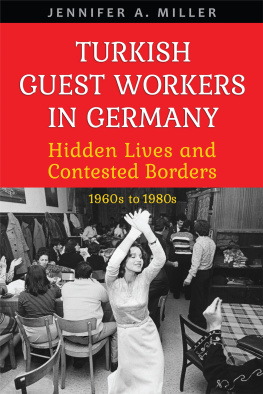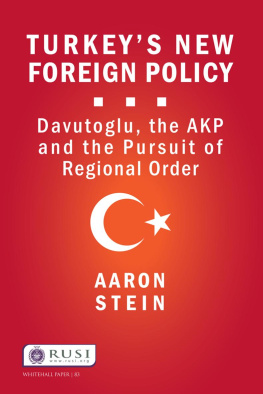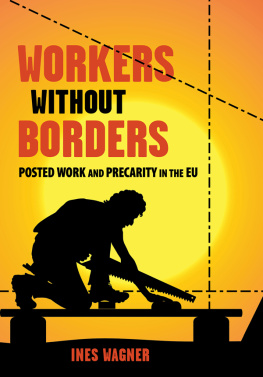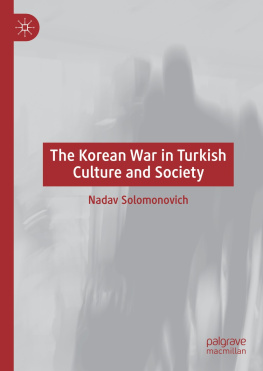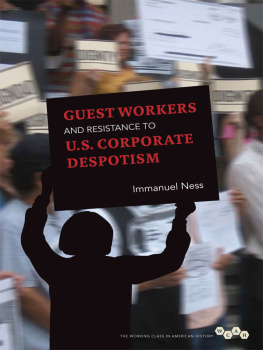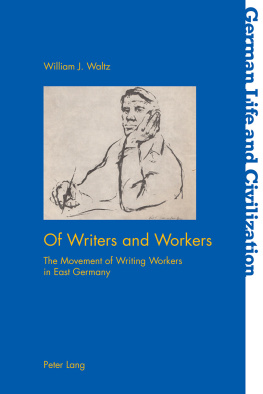Miller argues that the guest worker program, far from creating a parallel society, involved constant interaction between foreign nationals and Germans. These categories were as fluid as the Cold War borders they crossed. Millers extensive use of archival research in Germany, Turkey, and the Netherlands examines the recruitment of workers, their travel, initial housing and work engagements, social lives, and involvement in labour and religious movements. She reveals how contrary to popular misconceptions, the West German government attempted to maintain a humane foreign labour system while the workers themselves made crucial, often defiant, decisions. Turkish Guest Workers in Germany identifies the Turkish guest worker program as a post-war phenomenon that has much to tell us about the development of Muslim minorities in Europe and Turkeys ever-evolving relationship with the European Union.
JENNIFER A. MILLER is an associate professor in the Department of Historical Studies at Southern Illinois University Edwardsville.
Turkish Guest Workers in Germany
Hidden Lives and Contested Borders, 1960s to 1980s
JENNIFER A. MILLER
UNIVERSITY OF TORONTO PRESS
Toronto Buffalo London
University of Toronto Press 2018
Toronto Buffalo London
utorontopress.com
Printed in Canada
ISBN 978-1-4875-0232-4 (cloth)
ISBN 978-1-4875-2192-9 (paper)

Printed on acid-free, 100% post-consumer recycled paper with vegetable-based inks.
(German and European Studies)
Library and Archives Canada Cataloguing in Publication
Miller, Jennifer A., 1976, author
Turkish guest workers in Germany : hidden lives and contested borders, 1960s to 1980s / Jennifer A. Miller.
(German and European studies ; 28)
Includes bibliographical references and index.
ISBN 978-1-4875-0232-4 (cloth) ISBN 978-1-4875-2192-9 (paper)
1. Foreign workers, Turkish Germany History 20th century. 2. Turks Germany Social conditions 20th century. 3. Turks Germany Economic conditions 20th century. I. Title. II. Series: German and European studies ; 28
HD8458.T9M55 2018331.624961043C2017-905739-1
University of Toronto Press acknowledges the financial assistance to its publishing program of the Canada Council for the Arts and the Ontario Arts Council, an agency of the Government of Ontario.

Acknowledgments
The debt of gratitude I owe to individuals and institutions, near and far, spanning the last dozen years, is immeasurable. Attempting to thank everyone will fail, but I ask for understanding.
I would like to thank the following institutions for their generous funding: the American Research Institute in Turkey, the German Academic Exchange Service, the Rutgers Graduate SchoolNew Brunswick, the Institute of Turkish Studies, the New York University Kevorkian Center, the Princeton Office of Population Research, the Rutgers Center for Historical Analysis, and the Berlin Program for Advanced German and European Studies, with funds provided by the Free University of Berlin. The conclusions, opinions, and statements are my own and not necessarily those of the sponsoring institutions.
I am also indebted to multiple librarians, professors, and archivists across the globe. I am especially thankful for the archivists and scholars at the Documentation Center and Museum of Migration in Cologne, especially archivist Nina Matuszewski; the Archive of Social Movements in Bochum; the German National Archives in Koblenz; the Friedrichshain-Kreuzberg Museum; the History Foundation in Istanbul; the Institute of Migration and Intercultural Studies of Osnabrck University; and the German Federal Commissioner for the Stasi Records, especially archivist Christel Tinz.
For their helpful comments, queries, inspiration, and support, I would like to thank the many seminars that allowed me to workshop various parts of the book: the 2003 Rutgers Modern European Seminar, especially Marc Matera, Cynthia Kreisel, and Kris Alexanderson; the 2003 Transatlantic Summer Institute Citizenship in Twentieth Century Germany, especially Winson Chu; the 20067 Berlin Program, especially Micheal Meng, J. Griffith Rollefson, and Nicholas Schlosser; the 2007 German Historical Institute Transatlantic Doctoral Seminar, especially Quinn Slobodan and William Morris; the 20078 Rutgers Center for Historical Analysis Seminar, The Question of the West; and the 2011 Fulbright German Studies Summer Seminary, Ethnic Diversity and National Identity, especially Gillian Glaes and Amy Foerster.
I am also indebted to the Rutgers Graduate SchoolNew Brunswick for providing not only research support but also excellent cohorts of fellow thinkers, readers, and scholars across disciplines, who inspired and sustained me. For their advice on tricky translations, my gratitude goes to zlem Serdarolu, Dilan Mete, Merve Doruk, Pinar Gibbon, Derrick Miller, Elisabeth Ernst, and Karolina MayChu. For their wide-ranging and charitable support, I would like to express thanks to Teresa Delcorso, Jochen Hellbeck, Temma Kaplan, Laura Marhoefer, Peter Polak-Springer, and Horst and Regina Tacke. I am especially grateful for the support and scholarly council of Belinda Davis, whose encouragement, patience, and insightful advice, spanning years, has never wavered. Thank you.
My colleagues at Southern Illinois University Edwardsville have welcomed me, and my students make my job a joy. In addition, internal grants and a sabbatical provided the time and support to complete the book. I am also grateful to the many colleagues who thoughtfully listened to, read, and commented on drafts. I am very fortunate.
I am especially indebted to the external readers whose careful reading, thoughtful comments, and constructive criticism greatly improved the manuscript. For excellent editorial support I would like to thank Amy Benson Brown, Andrea Mongler, and Richard Ratzlaff. Of course, any errors are completely my own.
This book is dedicated to my parents, Margaret Waldrep Miller and Nathan Miller, whose brilliant minds and generous hearts inspired me to love learning and stay curious. My parents shaped who I have become with their lifelong support of my education and their encouragement to research, travel, and write. Though my father died as I was completing the books final editing, I know he would be proud.
TURKISH GUEST WORKERS IN GERMANY
Hidden Lives and Contested Borders, 1960s to 1980s
Introduction
Twenty-year-old Elif departed Istanbul for West Berlin on 10 November 1964. Not surprisingly, the conflict carried over to Istanbul, where tensions between ethnic Greeks and Turks had long simmered. Elifs boss was just one of many harassed in 1964. Feeling threatened, he closed his shop and departed Istanbul, leaving Elif unemployed and unsure of her future. Indirectly, the civil war in Cyprus prompted her to make a choice that was popular at the time she moved to West Berlin with a contract as a

